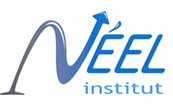- Accueil
- Institut Néel
- Équipes de recherche
- Pôles & Services techniques
- Travailler à l’institut
- Partenariats
- Actualités
- Agenda
- Annuaire
Mercredi 3 Mars 2021 à 14h
Lien visio : https://smartvisio2.neel.cnrs.fr/b/dyl-gk1-ci6
The talk will be in English
Recent advances in observing and exploiting macroscopic mechanical motion at the quantum limit brought opto-mechanical experiments down to always lower temperatures and smaller sizes, boosting a new research area were (more compatible) low energy photons are employed: microwave opto-mechanics.
Superconducting microwave circuits are in use and bridge opto-mechanics with quantum electronics, which positions the former as a new resource for quantum information processing. But microwave opto-mechanical platforms provide also unique capabilities for testing quantum mechanics at the most basic level: if one thinks about these devices in terms of quantum-limited detectors, the focus is on the thermodynamic baths that continuously interact with the mechanical degree of freedom. The fundamental questions that are addressed are then quantum thermodynamics, the boundary between classical and quantum mechanics defined by wavefunction collapse, and ultra-low temperature materials properties.
In order to perform such experiments at the frontier of modern physics, we created a unique micro-wave/micro-Kelvin opto-mechanical platform. We demonstrate for the first time the passive cooling of a 15 MHz aluminium drumhead mechanical device down to 500 micro-K, reaching a population for the fundamental mode of 0.3 quanta on average; all higher modes being empty to a very high probability. Using microwave opto-mechanics as a non-invasive detector, we report on the in-equilibrium thermal properties of this lowest frequency mode, challenging theory in an unprecedented experimental area.
Thesis Director: Eddy Collin (Institut Néel) & Xin Zhou (IEMN)
